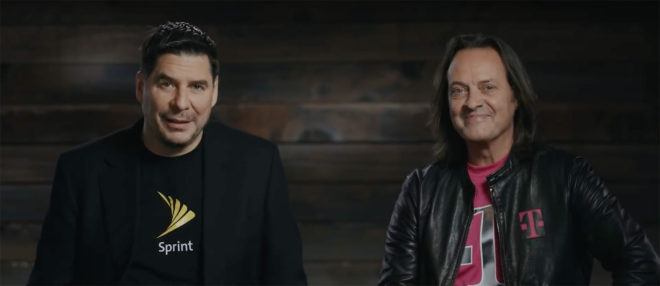
Today’s a big day for T-Mobile and Sprint’s proposed merger.
The trial between T-Mobile and Sprint and the state attorneys general who oppose their merger got underway today. As noted by the Wall Street Journal, U.S. District Jude Victor Marrero seems to be pushing for a quick trial, skipping opening statements and asking both sides to shorten their lists of witnesses so that they don’t beat him “over the head” with testimonies.
One notable person that took the stand today was Roger Sole, Sprint’s Chief Marketing Officer. He explained that Sprint tried aggressive promotions to lure customers but that the deals’ “early success faded away pretty soon” because subscribers had a negative experience with Sprint’s network quality.
Meanwhile, lawyers for the states showed that when Sprint launched an aggressive deal in 2016 to offer plans similar to the other big U.S. carriers, T-Mobile’s MetroPCS lowered prices on its plans. Those lawyers also submitted messages between Sole and Marcelo Claure from 2017 that suggested that Sprint wanted a merger so it could get more money from each customer, with Sole suggesting that it could increase average revenue per user by $5. Sole has said that he was just expressing a thought that price increases could happen “very far down the road.”
Also taking the stand today was Angela Rittgers, SVP of Sales and Marketing for Sprint’s prepaid brands, and Deutsche Telekom CEO Timotheus Höttges. The states’ lawyers said T-Mobile’s parent company “dug into its pockets” and poured billions into the T-Mo network to turn around its performance and suggested that Sprint could do the same on its own, and while Höttges acknowledged DT’s help, he added that T-Mobile also benefitted from the $3 billion breakup fee that it got from the failed merger of AT&T and T-Mobile.
The lawsuit includes 14 state attorneys general from New York, California, Connecticut, Hawaii, Illinois, Maryland, Massachusetts, Michigan, Minnesota, Oregon, Pennsylvania, Virginia, Wisconsin, and Washington D.C.
The states argue that if the merger is allowed to happen, it will “substantially lessen competition” in mobile, prices for wireless services are likely to be higher than they would be without the merger, the quality of mobile services are likely to be lower than they otherwise would be, and “innovation will likely be reduced.” The states have also argued that Dish doesn’t have the wireless industry experience to replace Sprint as a competitive force.
T-Mobile has been working to reduce the number of states involved in the lawsuit against the merger, striking deals with Nevada, Texas, and Colorado that got them to exit the lawsuit. Fox Business‘s Charles Gasparino claims that T-Mobile executives are discussing elements of a possible settlement offer for the state AGs still involved in the lawsuit. That settlement offer could reportedly include allowing workers to unionize, price controls, and a rural broadband buildout.
T-Mobile CEO John Legere recently said that he expects the merger with Sprint to be permitted to close in early 2020.
Sources: Reuters, WSJ, NY AG Letitia James (1), (2), Charles Gasparino (Twitter)
